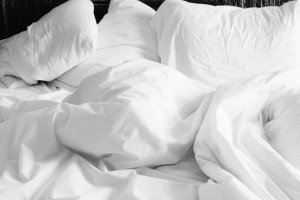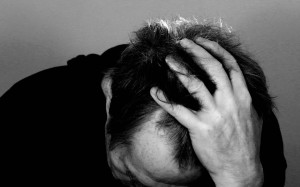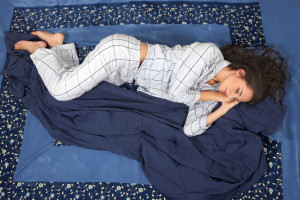Contributor: W. Travis Stewart, LPC, NCC writer for Addiction Hope
 Comedian Steven Wright (he of dry humor and deadpan delivery) once said,
Comedian Steven Wright (he of dry humor and deadpan delivery) once said,
“When I woke up this morning my girlfriend asked me, ‘Did you sleep good?’ I said, ‘No, I made a few mistakes.’
Sleep seems like it should be one of those things that we all do well without much thought or effort, much like breathing. You are never taught how to sleep; it’s one of the few things babies emerge from the womb knowing how to do. Yet, many of us don’t sleep well.
We ‘make mistakes’ as Wright observes and find ourselves lying flat on our back, lying in bed and watching the little red light on the smoke detector blink on and off. Others of us have more serious problems with sleep disorders such as Insomnia, Sleep Apnea or Restless leg syndrome. The National Institute of Neurological Disorders and Stroke have the following descriptions of the three most common sleep disorders: [1]
Common Sleep Disorders
 Insomia - [the inability to fall or stay asleep] This problem can result from stress, jet lag, diet, or many other factors. Insomnia almost always affects job performance and well-being the next day.
Insomia - [the inability to fall or stay asleep] This problem can result from stress, jet lag, diet, or many other factors. Insomnia almost always affects job performance and well-being the next day.
About 60 million Americans a year have insomnia frequently or for extended periods of time, which leads to even more serious sleep deficits. Insomnia tends to increase with age and affects about 40 percent of women and 30 percent of men. It is often the major disabling symptom of an underlying medical disorder.
Sleep Apnea - Sleep apnea is a disorder of interrupted breathing during sleep. It usually occurs in association with fat buildup or loss of muscle tone with aging. These changes allow the windpipe to collapse during breathing when muscles relax during sleep.
This problem, called obstructive sleep apnea, is usually associated with loud snoring (though not everyone who snores has this disorder). Sleep apnea also can occur if the neurons that control breathing malfunction during sleep. An estimated 18 million Americans have sleep apnea. However, few of them have had the problem diagnosed.
Restless Leg Syndrome - this is a familial disorder causing unpleasant crawling, prickling, or tingling sensations in the legs and feet and an urge to move them for relief is emerging as one of the most common sleep disorders, especially among older people. This disorder, which affects as many as 12 million Americans, leads to constant leg movement during the day and insomnia at night. [2]
Lack of Sleep can be Costly
 Lack of sleep due to these disorders can be extremely troubling and costly. The Centers for Disease Control and Prevention states that poor sleep is a public health concern and is “linked to motor vehicle crashes, industrial disasters, and medical and other occupational errors.” [3]
Lack of sleep due to these disorders can be extremely troubling and costly. The Centers for Disease Control and Prevention states that poor sleep is a public health concern and is “linked to motor vehicle crashes, industrial disasters, and medical and other occupational errors.” [3]
Time magazine reported that “insomnia costs the average American worker 11.3 days, or $2,280 in lost productivity each year. That adds up to $63.2 billion (and 252.7 workdays) for the whole country.” [4] Suffice it to say, people get pretty desperate for a good night’s sleep. Many turn to sleep aids such as the prescription medication LUNESTA.
Side Effects with Lunesta
Technically speaking LUNESTA (eszopiclone) is a nonbenzodiazepine hypnotic agent. According to the LUNESTA website it works by acting on GABA, or gamma-aminobutyric acid. They also report that it is the most commonly prescribed sleep aid in the country. Its advocates report that clinical trials show that it helps individuals fall asleep more quickly and stay asleep longer [5]. LUNESTA's critics emphasize some of its dangers, such as those listed in this Federal Drug Administration report:
After taking LUNESTA, you may get up out of bed while not being fully awake and do an activity that you do not know you are doing. The next morning, you may not remember that you did anything during the night. These include driving a car, making and eating food, talking on the phone, having sex and sleep walking. [6]
Risk of Dependency
 From an addictive standpoint there a significant concerns about users becoming dependent on the drug for sleep. Some individuals may even enter a treatment center in order to break that dependency.
From an addictive standpoint there a significant concerns about users becoming dependent on the drug for sleep. Some individuals may even enter a treatment center in order to break that dependency.
The problem with taking a sleep aid to fall asleep is that the individual does not learn good sleep habits. What once came naturally to us as infants gets disrupted by psychological problems, increased caffeine use, more time in front of computer and mobile screens and lack of exercise.
Use of a sleep aid should be very short lived and only a last resort. Before talking to your doctor about a prescription make sure you are developing good sleep habits as well as considering Cognitive Behavioral Therapy to deal with disrupted sleep.
Psychologist Len Matheson of St. Louis, Missouri provides guidelines for getting brain-restorative sleep—the kind of sleep where your brain full engages in the restorative and restful activities it needs to get during the night. [7]
These tips include:
- Make sure your bedroom is quiet, dark, relaxing, and cool but not cold.
- Limit caffeine and ingest none within 6 hours before bedtime.
- Determine when you need to get up and give yourself permission to sleep until then.
- Within one hour of bed, avoid all electronic cognitive input unless it is restful.
- Begin to turn off lights and darken your home several hours before bedtime.
- If you awaken with worries, use the bathroom and return to bed without bright lights.
- If you don’t fall asleep in ten minutes, get up and either get into your day or sit comfortably in a dark room and rest until you fall asleep or need to get up.
- If you have issues on your mind that are causing you to stay awake, write them down and tell yourself you will get to them tomorrow.
- If you can’t sleep, don’t lie in bed awake. Get up, stretch, and then go back to bed. Or, try sleeping in a different location.
- Sleep cycles are 90 minutes in length. The ideal amount of sleep for adults is either 7.5 or 9 hours. Plan your bedtime and wake time accordingly.
Community Discussion – Share your thoughts here!
What has been your experience with sleep disorders and addiction? What natural ways have your found to get the rest that you need? What has worked well for you and what hasn’t?
About the Author
Travis graduated from the University of Nebraska in 1991 with a degree in advertising and immediately began working with the international ministry of The Navigators, mentoring students. After 8 years, his desire to better understand how people change, and through his own experience of receiving help from a professional counselor, Travis decided to return to school. He earned a Master of Arts in Counseling (2001) and a Master of Arts in Theological Studies (2003), both from Covenant Seminary in St. Louis, MO. Travis is a Licensed Professional Counselor in the State of Missouri.
References:
- http://www.ninds.nih.gov/disorders/brain_basics/understanding_sleep.htm#sleep_disorders
- For a more detailed look at sleep disorders visit The National Sleep Foundation’s website: http://sleepfoundation.org/sleep-disorders-problems
- http://www.cdc.gov/features/dssleep/index.html#References
- http://healthland.time.com/2011/09/01/the-high-cost-of-bad-sleep-63-billion-per-year/
- http://www.lunesta.com/index.html
- http://www.fda.gov/downloads/Drugs/DrugSafety/UCM134691.pdf
- http://www.faithfulbrain.com/2015/08/brain-restorative-sleep/
Last Updated & Reviewed By: Jacquelyn Ekern, MS, LPC on August 24, 2015. Published on AddictionHope.com

